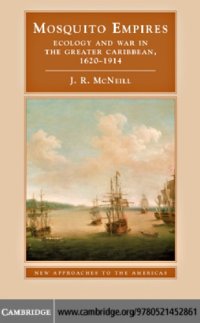
Ebook: Mosquito empires: ecology and war in the Greater Caribbean, 1620-1914
Author: McNeill John Robert
- Tags: Epidemics, Epidemics--Caribbean Area--History, Human ecology, Human ecology--Caribbean Area--History, Malaria, Malaria--Caribbean Area--History, Malaria--Environmental aspects, Malaria--Environmental aspects--Caribbean Area--History, Medical geography, Medical geography--Caribbean Area--History, Mosquitoes--Caribbean Area--pathogenicity, Nature--Effect of human beings on, Nature--Effect of human beings on--Caribbean Area--History, Revolutions, Revolutions--Caribbean Area--History, Social change, Social change--
- Series: New approaches to the Americas
- Year: 2010
- Publisher: Cambridge University Press
- City: Caribbean Area
- Language: English
- pdf
This book explores the links among ecology, disease, and international politics in the context of the Greater Caribbean - the landscapes lying between Surinam and the Chesapeake - in the seventeenth through early twentieth centuries. Ecological changes made these landscapes especially suitable for the vector mosquitoes of yellow fever and malaria, and these diseases wrought systematic havoc among armies and would-be settlers. Because yellow fever confers immunity on survivors of the disease, and because malaria confers resistance, these diseases played partisan roles in the struggles for empire and revolution, attacking some populations more severely than others. In particular, yellow fever and malaria attacked newcomers to the region, which helped keep the Spanish Empire Spanish in the face of predatory rivals in the seventeenth and early eighteenth centuries. In the late eighteenth and through the nineteenth century, these diseases helped revolutions to succeed by decimating forces sent out from Europe to prevent them.
Download the book Mosquito empires: ecology and war in the Greater Caribbean, 1620-1914 for free or read online
Continue reading on any device:

Last viewed books
Related books
{related-news}
Comments (0)